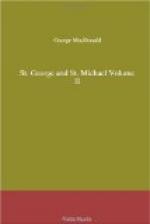Roger Heywood was troubled in heart at the aspect of affairs. There was now a strong peace-party in the parliament, and to him peace and ruin seemed the same thing. If the parliament should now listen to overtures of accommodation, all for which he and those with whom he chiefly sympathised had striven, was in the greatest peril, and might be, if not irrecoverably lost, at least lost sight of, perhaps for a century. The thing that mainly comforted him in his anxiety was that his son had showed himself worthy, not merely in the matter of personal courage, which he took as a thing of course in a Heywood, but in his understanding of and spiritual relation to the questions really at issue,—not those only which filled the mouths of men. For the best men and the weightiest questions are never seen in the forefront of the battle of their time, save by “larger other eyes than ours.”
But now, from his wounds, as he thought, and the depression belonging to the haunting sense of defeat, a doubt had come to life in Richard’s mind, which, because it was born in weakness, he very pardonably looked upon as born of weakness, and therefore regarded as itself weak and cowardly, whereas his mood had been but the condition that favoured its development. It came and came again, maugre all his self-recrimination because of it: what was all this fighting for? It was well indeed that nor king nor bishop should interfere with a man’s rights, either in matters of taxation or worship, but the war could set nothing right either betwixt him and his neighbour, or betwixt him and his God.
There was in the mind of Richard, innate, but more rapidly developed since his breach with Dorothy, a strong tendency towards the supernatural—I mean by the word that which neither any one of the senses nor all of them together, can reveal. He was one of those young men, few, yet to be found in all ages of the world’s history, who, in health and good earthly hope, and without any marked poetic or metaphysical tendency, yet know in their nature the need of conscious communion with the source of that nature—truly the veriest absurdity if there be no God, but as certainly the most absolute necessity of conscious existence if there be a first life from whom our life is born.
‘Am I not free now?’ he said to himself, as he lay on his bed in his own gable of the many-nooked house; ’Am I not free to worship God as I please? Who will interfere with me? Who can prevent me? As to form and ceremony, what are they, or what is the absence of them, to the worship in which my soul seeks to go forth? What the better shall I be when all this is over, even if the best of our party carry the day? Will Cromwell rend for me the heavy curtain, which, ever as I lift up my heart, seems to come rolling down between me and him whom I call my God? If I could pass within that curtain, what would Charles, or Laud, or Newcastle, or the mighty Cromwell himself and all his Ironsides be to me? Am I not on the wrong road for the high peak?’




